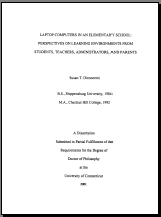Laptop computers in an elementary schoolPerspectives on learning environments from students, teachers, administrators, and parents
|

|
 Diese Seite wurde seit 8 Jahren inhaltlich nicht mehr aktualisiert.
Unter Umständen ist sie nicht mehr aktuell.
Diese Seite wurde seit 8 Jahren inhaltlich nicht mehr aktualisiert.
Unter Umständen ist sie nicht mehr aktuell.
 Zusammenfassungen
Zusammenfassungen
 This ethnographic study exarnined how laptop computers are used initially in an
elementary school. Interviews and observations with students, teachers, administraton,
and support staff were conducted to obtain their perspectives about how laptops affected
classroom instruction, participants' behaviors, and the school's culture. As computer
technology and Intemet access have quickly been added to clasrooms, the literature
focuses on the types of software being used by teachers and students, teachers'
preparedness, and bandwidth dificulties. This study explored the human factor - the
reactions, opportunities, and challenges encountered by parents, teachers, students, and
administraton once laptop computer technology was delivered to a school.
This ethnographic study exarnined how laptop computers are used initially in an
elementary school. Interviews and observations with students, teachers, administraton,
and support staff were conducted to obtain their perspectives about how laptops affected
classroom instruction, participants' behaviors, and the school's culture. As computer
technology and Intemet access have quickly been added to clasrooms, the literature
focuses on the types of software being used by teachers and students, teachers'
preparedness, and bandwidth dificulties. This study explored the human factor - the
reactions, opportunities, and challenges encountered by parents, teachers, students, and
administraton once laptop computer technology was delivered to a school. While nearly all schools in the United States currently have Internet access, teachers report that they are not well-prepared for integrating computers into their instruction, do not have administrative support, and are ill-prepared for creating the type of classroom environments in which students will use technology. Qualitative investigations have not examined how teachers, students, and parents perceive these barriers or respond to these challenges when they use laptop computers.
While nearly all schools in the United States currently have Internet access, teachers report that they are not well-prepared for integrating computers into their instruction, do not have administrative support, and are ill-prepared for creating the type of classroom environments in which students will use technology. Qualitative investigations have not examined how teachers, students, and parents perceive these barriers or respond to these challenges when they use laptop computers.
This ethnographic study investigated how the implementation of laptop computers, where every teacher and every Grade 3 through Grade 5 student had a laptop, affected teaching and learning in an urban elementary school over an academic year. The following questions guided the study. What changes do teachers make as they integrate laptops into their instruction? How do teachers increase their technology skills while trying to teach the curriculum? How do students and teachers describe methods of instruction before and after the implementation of laptop computers?
The methodology for the study included (a) in-depth interviews with 177 students 22 teachers, 24 parents, administrators, and support staff during 95 days of data collection, (b) observations in classrooms, faculty meetings, inservices, PTO and Site Based meetings, and social gatherings, and (c) review of artifacts (e.g., teacher lessons, student work, communications, and e-mail correspondence). Additionally, over 700 digital photos, video and digital voice recordings of participants were taken during the study.
Two core categories emerged from the data analyses. The use of laptops in the schools (a) created a new motivation for teaching and learning and (b) indicated that meaningful professional development and technical support must be relevant and accessible. Themes from the data included teacher excitement, student enjoyment, teachers use of laptops to increase understanding of content areas, and the positive impact on the school culture. Themes that supported the need for professional and technical support included the concerns and challenges teachers faced; one-size fits all professional development, and the absence of a school technology plan.
 Diese Doktorarbeit erwähnt ...
Diese Doktorarbeit erwähnt ...
 Diese Doktorarbeit erwähnt vermutlich nicht ...
Diese Doktorarbeit erwähnt vermutlich nicht ... 
 Nicht erwähnte Begriffe | Bildung, Digitalisierung, Lernen, Notebook, One-to-One-Computing, Schweiz, Unterricht |
 Tagcloud
Tagcloud
 Zitationsgraph
Zitationsgraph
 Zitationsgraph (Beta-Test mit vis.js)
Zitationsgraph (Beta-Test mit vis.js)
 Zeitleiste
Zeitleiste
 3 Erwähnungen
3 Erwähnungen 
- Implementation and Effects Of One-to-One Computing Initiatives - A Research Synthesis (William R. Penuel) (2006)


- Masterplan Lernstick - Live-System-Learning mit Blick auf die flächendeckende Verbreitung des Lernsticks in der Schweiz (Stanley Schwab, Marc Widmer) (2009)

- Der Lernstick als Lernwerkzeug in der Schule im Kontext des mLearnings (Hans U. Grunder) (2011)
 Co-zitierte Bücher
Co-zitierte Bücher


Kleine Computer für kleine Hände (Buch mit DVD)
(Ilse Bailicz, Wolfgang Seper, Leopold Sperker, Johann Eder, Anton Reiter) (2006)


Technologie, Imagination und Lernen
Grundlagen für Bildungsprozesse mit Digitalen Medien
(Heidi Schelhowe) (2007)

 Volltext dieses Dokuments
Volltext dieses Dokuments
 |  Laptop computers in an elementary school: Gesamtes Buch als Volltext ( Laptop computers in an elementary school: Gesamtes Buch als Volltext ( : :  , 7477 kByte; , 7477 kByte;  : :  2021-03-21) 2021-03-21) |
 Anderswo suchen
Anderswo suchen 
 Beat und diese Dissertation
Beat und diese Dissertation
Beat hat diese Dissertation während seiner Zeit am Institut für Medien und Schule (IMS) ins Biblionetz aufgenommen. Beat besitzt kein physisches, aber ein digitales Exemplar. Eine digitale Version ist auf dem Internet verfügbar (s.o.). Es gibt bisher nur wenige Objekte im Biblionetz, die dieses Werk zitieren.









 Computer
Computer Eltern
Eltern Kinder
Kinder LehrerIn
LehrerIn Primarschule (1-6) / Grundschule (1-4)
Primarschule (1-6) / Grundschule (1-4) Schule
Schule USA
USA












 Biblionetz-History
Biblionetz-History